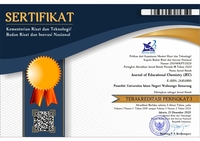The Effect of Android Game-Based Learning Media on Student Learning Outcomes in Terms of Self-Directed Learning
DOI:
https://doi.org/10.21580/jec.2023.5.2.21689Keywords:
android game-based learning, chemistry learning, digital learning, self-directed learning, student learning outcomeAbstract
The aim of this study was to investigate the effect of android-based game learning media on student learning outcome in terms of self-directed learning. This study conducted in experimental research using two-way Anova design with student learning outcome as the dependent variable. The independent variable in this study is the use of Android game-based learning media in acid and base. A total 45 students at SMA N 2 Wonosari participated in this study, consisting of 21 students in the experimental group and 24 students in control group. This sample drawn by cluster random technique. The treatment group received learning with the assist of android game-based media while the control group only used textbooks conventionally. Student learning outcomes are measured using multiple choice questions. This instrument was tested before being used to examine the validity and reliability. To test the hypothesis analisys of variance test was being carried out. Result for the main hypothesis shows that there are differences between experimental group and control group on student learning outcome. Class that used android game-based learning media gain higher cognitive learning outcome than the conventional class. There are no differences in student learning outcome at any level of student self-directed learning. Also there are no interaction between student self-directed learning and student learning outcome.Downloads
References
Acquah, E. O., & Katz, H. T. 2020. Digital Game-Based L2 Learning Outcomes for Primary Through High-School Students: A Systematic Literature Review. Computers and Education, 143, 103667. https://doi.org/10.1016/j.compedu.2019.103667
Alotaibi, K. N. 2016. The Learning Environment as a Mediating Variable Between Self-Directed Learning Readiness and Academic Performance of a Sample of Saudi Nursing and Medical Emergency Students. Nurse Education Today, 36, 249–254.
Burrows, Nikita. L., & Mooring, S. R. 2015. Using Concept Mapping to Uncover Students’ Knowledge Structures of Chemical Bonding Concept. Chemistry Education Research and Practice, 16(1), 53–66.
Cahyana, U., Paristiowati, M., Savitri, D. A., & Hasyrin, S. N. 2017. Developing and Application of Mobile Game Based Learning (M-GBL) for High School Students Performance in Chemistry. Eurasia Journal of Mathematics, Science and Technology Education, 13(10), 7037–7047.
Cicilia Emita, & Samuel Lukas. 2022. The Effect of Learning Independence, Self-Regulation, and Social Support on Learning Achievement among Psychology Department Students X University in Covid-19 Pandemic Era. JTP - Jurnal Teknologi Pendidikan, 24(3), 283–294.
Clark, D. B., Tanner-Smith, E. E., & Killingsworth, S. S. 2016. Digital Games, Design, and Learning: A Systematic Review and Meta-Analysis. Review of Educational Research, 86(1), 79–122.
Dickey, M. D. 2005. Engaging by Design: How Engagement Strategies in Popular Computer and Video Games can Inform Instructional Design. Educational Technology Research and Development, 53(2), 67–83.
Gureckis, T. M., & Markant, D. B. 2012. Self-Directed Learning: A Cognitive and Computational Perspective. Perspectives on Psychological Science, 7(5), 464–481.
Heer, R. 2018. A Model of Learning Objectives based on A Taxonomy for Learning, Teaching, and Assessing: A Revision of Bloom’s Taxonomy of Educational Objectives. Ames: Iowa State University
Khalid, M., Bashir, S., & Amin, H. 2020. Relationship between Self-Directed Learning (SDL) and Academic Achievement of University Students: A Case of Online Distance Learning and Traditional Universities. Bulletin of Education and Research August, 42(2), 131-148.
Kusumawati, D., Sofyan, R., & Jatmikowati, T. E. 2022. The Level of Student Learning Independence: Between the Future Goals and Facts. Jurnal Pendidikan Islam Indonesia, 7(1), 24–33.
Nadeem, M., Oroszlanyova, M., & Farag, W. 2023. Effect of Digital Game-Based Learning on Student Engagement and Motivation. Computers, 12(9), 177.
Neck, C. P., & Houghton, J. D. 2006. Two decades of self‐leadership theory and research. Journal of Managerial Psychology, 21(4), 270–295.
Toh, W., & Kirschner, D. 2020. Self-Directed Learning in Video Games, Affordances and Pedagogical Implications for Teaching and Learning. Computers & Education, 154, 103912.
Wang, L. H., Chen, B., Hwang, G. J., Guan, J. Q., & Wang, Y. Q. 2022. Effects of Digital Game-Based STEM Education on Students’ Learning Achievement: a Meta-Analysis. International Journal of STEM Education, Springer Science and Business Media Deutschland GmbH, 9(1), 26.
Westera, W. 2015. Games are Motivating, aren´t They? Disputing the Arguments for Digital Game-Based Learning. International Journal of Serious Games, 2(2).
Widoyoko, E. P. 2011. Evaluasi Program Pembelajaran. Yogyakarta: Pustaka Pelajar.
Yu, Z., Gao, M., & Wang, L. 2021. The Effect of Educational Games on Learning Outcomes, Student Motivation, Engagement and Satisfaction. Journal of Educational Computing Research, 59(3), 522–546.
Downloads
Published
How to Cite
Issue
Section
License
The copyright of the received article shall be assigned to the journal as the publisher of the journal. The intended copyright includes the right to publish the article in various forms (including reprints). The journal maintains the publishing rights to the published articles.
Authors are permitted to disseminate published articles by sharing the link/DOI of the article at the journal. Authors are allowed to use their articles for any legal purposes deemed necessary without written permission from the journal with an acknowledgment of initial publication to this journal.

This work is licensed under a Creative Commons Attribution-NonCommercial-ShareAlike 4.0 International License.


